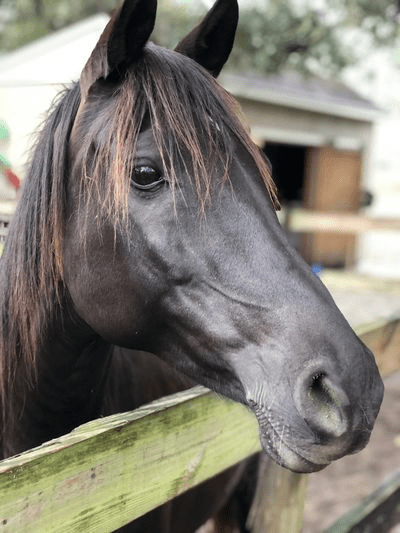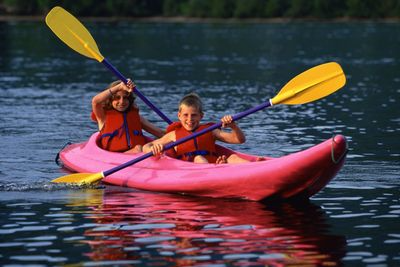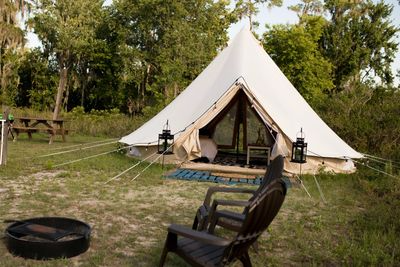
Horseback Riding
-
1. Participants/ Riders overall weight along with their height to weight ratio directly affects their ability to safely ride a horse. The BMI score for riders may not exceed 31. For guided trail rides, participants must be a minimum of 8 years old.
2. Be willing and able to follow rules and obey authority figures (such as staff members or DEP employees)
3. Understand and follow instructions given to you, verbally or written, presented individually or to a group, including directives regarding hazards/risks;
4. Have the ability to perceive hazards/risks and respond to instructions regarding hazards/risks such as wildlife, approaching storms, etc.;
5. Effectively communicate with or to other participants or staff regarding potential hazards/risks, personal distress, injury, or need for assistance, up to a distance of 50 meters.
6. Act reliably and responsibly even when not directly supervised
7. Perform necessary self-care in a remote and outdoor environment, including personal hygiene, adequate hydration, dressing appropriately for weather conditions and responsibility for and organization of personal gear;
8. Remain alert and focused for the duration of your outdoor experience.
9. Tolerate being outdoors in typical Florida weather, for the duration of your experience.
10.Be able to sit upright for an extended period of time with legs stretched out in front of you.
11.Master moderately athletic balancing skills.
12. Be able to effectively communicate with the instructor and other course participants
13. Be able to manage all personal care independently, or with the assistance of a companion
14. Be able to manage all personal mobility independently, or with the assistance of a companion
KEEP IN MIND: Horseback riding is a strenuous sport. Physical fitness is one of many factors that determine your ability to safely participate. We reserve the right to decline service to any individual that, in the opinion of management/lead guide, cannot be safely accommodated.
Participants are required to wear closed toed shoes (boots or shoes with a heel (not high heels) preferred) .
Long Pants are HIGHLY recommended but not a requirement.
All guest are REQUIRED to wear a helmet, which we provide.

Paddle Sports
-
1. Be willing and able to follow rules and obey authority figures (such as staff members or DEP employees)
2. Understand and follow instructions given to you, verbally or written, presented individually or to a group, including directives regarding hazards/risks;
3. Have the ability to perceive hazards/risks and respond to instructions regarding hazards/risks such as wildlife, approaching storms, etc.;
4. Effectively communicate with or to other participants or staff regarding potential hazards/risks, personal distress, injury, or need for assistance, up to a distance of 50 meters.
5. Possess strong swimming skills.
6. Act reliably and responsibly even when not directly supervised
7. Perform necessary self-care in a remote and outdoor environment, including personal hygiene, adequate hydration, dressing appropriately for weather conditions and responsibility for and organization of personal gear;
8. Remain alert and focused for the duration of your outdoor experience.
9.Tolerate being outdoors in typical Florida weather, for the duration of your experience.
10. Be able to lift 20lbs to chest height.
11. Be able to sit upright for an extended period of time with legs stretched out in front of you.
12. Perform a sweeping motion with arms and shoulders repetitively, similar to sweeping a floor, while exerting roughly 15lbs or more of pressure against the handle.
13. Ability to go from a standing to sitting position, and sitting to standing position with minimal assistance.
14. Master moderately athletic balancing skills.
15. Be able to hold their breath while under water and, while in the water wearing a properly fitted lifejacket, be able to independently turn from a face-down to a face-up position keeping their head above water
16. Be able to locate on your vest and blow a whistle while face up in the water.
17. Be able to effectively communicate with the instructor and other course participants
18. Be able to manage all personal care independently.
19. Be able to manage all personal mobility independently.

Camping
-
1. Be willing and able to follow rules and obey authority figures.
2. Understand and follow instructions given to you, verbally or written, presented individually or to a group, including directives regarding hazards/risks;
3. Have the ability to perceive hazards/risks and respond to instructions regarding hazards/risks such as soft patches, loose rock, or approaching storms, etc.;
4. Effectively communicate with or to other participants or leaders regarding potential hazards/risks, personal distress, injury, or need for assistance up to a distance of 50 meters, where darkness, high wind or other factors may impede communication;
5. Act reliably and responsibly even when not directly supervised;
6. Perform necessary self-care in a remote and outdoor environment, including personal hygiene, adequate hydration, dressing appropriately for weather conditions and responsibility for and organization of personal gear;
7. Lift and carry weight, including personal belongings, gear or provisions;
8. Competently navigate a variety of uneven and challenging terrain. This includes but is not limited to: traveling on and off-trail,
9. Remain alert and focused for the duration of your outdoor experience.
10. Tolerate being outdoors for multiple days in all types of weather with a variety of stimuli, including bugs, extreme temperature changes, intense sunlight, wind, storms and wildlife;
11. Tolerate changes in diet, group living, long days filled with mentally and physically challenging activities, and a routine that is likely much different than your routine at home;
12. Learn skills and engage in tasks to support yourself and the group including those necessary for living in remote areas. This includes, but is not limited to: cooking, setting up and taking down camp, washing dishes, caring for group gear, packing dry bags and backpacks, and camp site clean-up;
13. Work effectively as a member of an expedition team. This includes taking personal responsibility for your belongings and behavior, effectively communicating ideas and concerns on an individual and group level, accepting differences, and possessing a willingness to put the needs of the group before those of the individual;
14. Respond appropriately in the face of unexpected challenges such as inclement weather, changes in itinerary, unfamiliar surroundings, and homesickness;

Bicycling
-
1. Be willing and able to follow rules and obey authority figures.
2. Understand and follow instructions given to you, verbally or written, presented individually or to a group, including directives regarding hazards/risks;
3. Have the ability to perceive hazards/risks and respond to instructions regarding hazards/risks such as soft patches, loose rock, or approaching storms, etc.;
4. Effectively communicate with or to other participants or leaders regarding potential hazards/risks, personal distress, injury, or need for assistance up to a distance of 50 meters, where darkness, high wind or other factors may impede communication
5. Act reliably and responsibly even when not directly supervised;
6. Perform necessary self-care in a remote and outdoor environment, including personal hygiene, adequate hydration, dressing appropriately for weather conditions and responsibility for and organization of personal gear;
7. Lift and carry weight, including personal belongings, gear or provisions;
8. Competently navigate a variety of uneven and challenging terrain. This includes but is not limited to: traveling on and off-trail,
9. Remain alert and focused for the duration of your outdoor experience.
10. Tolerate being outdoors for the duration of your experience.
11. Tolerate being several hours or up to a day away from medical facilities;
12. Interact responsibly in a group and support a team approach, understanding that every participant shares in the responsibility for their own well-being and the well-being of the group;
13. Ability to lift your own personal belongings to chest height.
14. Be able to sit upright for an extended period of time with legs stretched below you with knees ranging from slightly bent to a 90 degree bend.
15. Ability to move legs in a pedaling motion with a low to medium level of resistance.
16. Ability to mount and dismount a bicycle by yourself.
17. Master moderately athletic balancing skills.
18. Be able to manage all personal care independently, or with the assistance of a companion
19. Be able to manage all personal mobility independently, or with the assistance of a companion